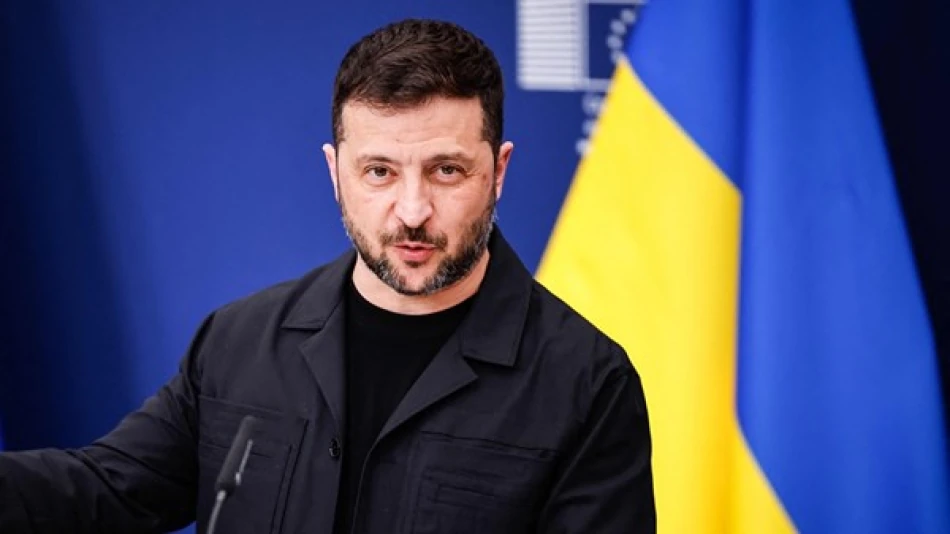
Zelenskyy's Resolute Pursuit of Peace: Ukraine's Unwavering Goal
Zelensky Signals Ukraine's Readiness for Security Framework Overhaul as Trump Era Begins
Ukrainian President Volodymyr Zelensky has declared his country's willingness to establish a "new security framework" and pursue a "genuine ceasefire," marking a potential shift in diplomatic strategy as he prepares to engage with Donald Trump's administration. The statement comes at a critical juncture when Ukraine faces mounting pressure to find sustainable solutions to its ongoing conflict with Russia.
A Strategic Pivot Toward Lasting Peace
Speaking ahead of his meeting with Trump in Washington, Zelensky emphasized Ukraine's commitment to achieving "lasting, reliable peace for Ukraine and all of Europe." His choice of words suggests a recognition that temporary ceasefires have proven insufficient, and that fundamental changes to regional security architecture may be necessary.
The Ukrainian leader's statement on X platform revealed a pragmatic approach: "Ukraine is ready for a genuine ceasefire and to establish a new security framework. We need peace." This represents a notable evolution from earlier positions that focused primarily on territorial restoration and military victory.
Reading Between the Lines: What "New Security Framework" Means
Zelensky's reference to a "new security framework" likely signals Ukraine's openness to creative diplomatic solutions that go beyond traditional NATO membership or existing European security arrangements. This could involve:
Potential Security Guarantees
Similar to arrangements seen in other conflict zones, Ukraine may be considering multilateral security guarantees from major powers, potentially including the United States, European allies, and even neutral parties. This approach mirrors successful frameworks established in post-conflict regions where formal military alliances proved politically unfeasible.
Buffer Zone Considerations
The emphasis on stopping "the killing" suggests Ukraine may be open to territorial arrangements that prioritize immediate humanitarian concerns over maximalist territorial claims. This pragmatic shift reflects the enormous human and economic costs the conflict has imposed on Ukrainian society.
Trump Factor: A New Diplomatic Dynamic
Zelensky's timing is significant. Trump has repeatedly claimed he could resolve the Ukraine conflict quickly, though without specifying mechanisms. The Ukrainian president's proactive stance suggests an attempt to shape negotiations before they begin, positioning Ukraine as a constructive partner rather than a supplicant.
This approach contrasts sharply with the more rigid diplomatic positions maintained during the Biden administration, when Ukrainian officials consistently rejected territorial compromises or security arrangements that fell short of full NATO membership.
European Implications and Regional Stability
By framing peace in terms of "all of Europe," Zelensky acknowledges that Ukraine's conflict has fundamentally altered continental security dynamics. A "new security framework" could potentially reshape relationships between NATO, the European Union, and non-aligned states in ways that extend far beyond Ukraine's borders.
European leaders will likely view this development with mixed feelings. While eager for conflict resolution, they may worry about precedents that could undermine existing security commitments or encourage revisionist powers elsewhere.
The Realism of War Fatigue
Zelensky's statement reflects growing recognition that military solutions alone cannot deliver sustainable peace. After years of conflict, Ukrainian society faces enormous reconstruction challenges that require stable, predictable security arrangements rather than ongoing military mobilization.
His gratitude toward "partners who work on achieving lasting and honorable peace" suggests coordination with international mediators who may have been working behind the scenes to develop viable compromise frameworks.
The success of any "new security framework" will ultimately depend on whether it can satisfy Ukraine's core sovereignty concerns while addressing Russia's stated security interests—a diplomatic challenge that will test the Trump administration's negotiating capabilities and international credibility.
Most Viewed News

 Layla Al Mansoori
Layla Al Mansoori






